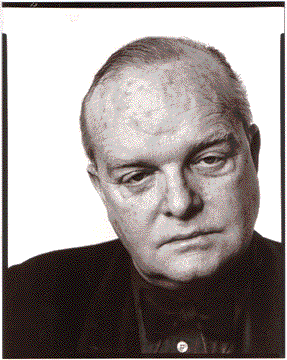
Nice pic, huh? Richard Avedon, believe it or not. Avedon apparently also took pictures for Capote's book In Cold Blood, according to the movie I saw last night which was, obviously, Capote. This is Truman, by the way, not Philip Seymour Hoffman, who won the Oscar for his portrayal. Hopefully Philip does less drugs than Truman did.
This is not normally a movie I would blog on, but I happened to watch the movie just after returning from a weekend sesshin in Atlanta, so perhaps I learned something I wouldn't have otherwise. It's not that the movie isn't well done; it is. Not only Hoffman's performance, but all the performances, are excellent. As movie-making, it's an excellent example of how craft can make anything shine, since really I'm not sure there's a movie here; or if there is, it's a very small one.
If you haven't seen the thing (and you should, as I said, just for the performances), it's basically the story of how author Truman Capote, a famous and infamous novelist, went to Kansas in about 1960 seemingly on a whime to write a town's reaction to the mass murder of a family by a couple of drifters. His magazine article turns into a book (In Cold Blood) that occupies him over several years. In the course of his story, he strikes up a "friendship" with one of the killers, who he betrays and abandons to execution. Capote comes across as a manipulative shithead, which he undoubtedly was.
Hoffman deserves his oscar just for the risk he takes here. In the hands of an inferior director, this movie would have been laughable. Capote was a flaming gay in the 50's and 60's. I remember him from the talk show circuit in the 60's, when I was too young to know just what the hell was wrong with this guy. So the overall quality here made Hoffman's career, but it could have destroyed it. So I'm not complaining.
And this is still not my point, but as a side note, the critical acclaim and resultant popular success of this movie surely should tell us of at least one problem with the Oscar process. Because the main flaw of this movie is, except for the brief closing note (something to the effect of, "Truman Capote never finished another book. He died in 1984 of complications from alcoholism"), you'd never know that the whole point was that what Capote did to complete his novel and make it a success, mainly sell out and betray the convicted killer whom he had pretended to befriend, for the purposes of gathering information, and then abandon the man to die so Capote could finish his book and get it out in time to profit from the whole mess, killed Capote. Yes, that sentence is a mess.
But no more so than the movie standing alone. If you miss that closing note, and if you don't know Capote's life, all you'll see is very well made movie about a shithead. And I have to believe that when the movie was sent out to critics to solicit Academy Award nominations, they got an explanation, which is more than you get if you just buy the DVD. My complaint about the movie is that its whole point relies on a external reference for understanding -- the later life and death of Capote, which is not included here. So the bottom line is, the film is very well made but really, fatally flawed by no less than its failure to include its own thesis.
So why am I bothering to write this, and why did I give the movie four stars on Netflix? First, because of the quality of the craft in this empty vessel, but second because I learned something from the eliptical moral. If you've been following, you'll know that I've had some regrets about my past. I think we all do. In my case, I can't help but think sometimes how materially successfull I would be now / would have been if I had followed through on my legal career, had done this, hadn't done that, etc. But I've alive, and I'm not trying to forget about a bunch of people I hurt. I mean, sure I've hurt people, but not manipulatively or intentionally, and if it got me what it got Capote, then no, it wouldn't have been worth whatever benefits I received. So in the reflective mood I was in when I saw Capote, it was vindicating for me.
By the way, I did some research on Capote's end after I saw the movie, and even that little ender left out a bunch. He died, not just of complications from alcoholism, but of drug abuse, and specifically of an overdose at the home of Johnny Carson's ex-wife. His epitaph was a quote from Teresa of Avila: "There are more tears shed over answered prayers than over unanswered prayers."
The moral seems to be, as Spike Lee said, "Do the Right Thing." And maybe be more verbal when you'r trying to blog than I am right now. As Deuce Rufus said in his "Nekkid Sleddin" blog, "We needs practice."
No comments:
Post a Comment